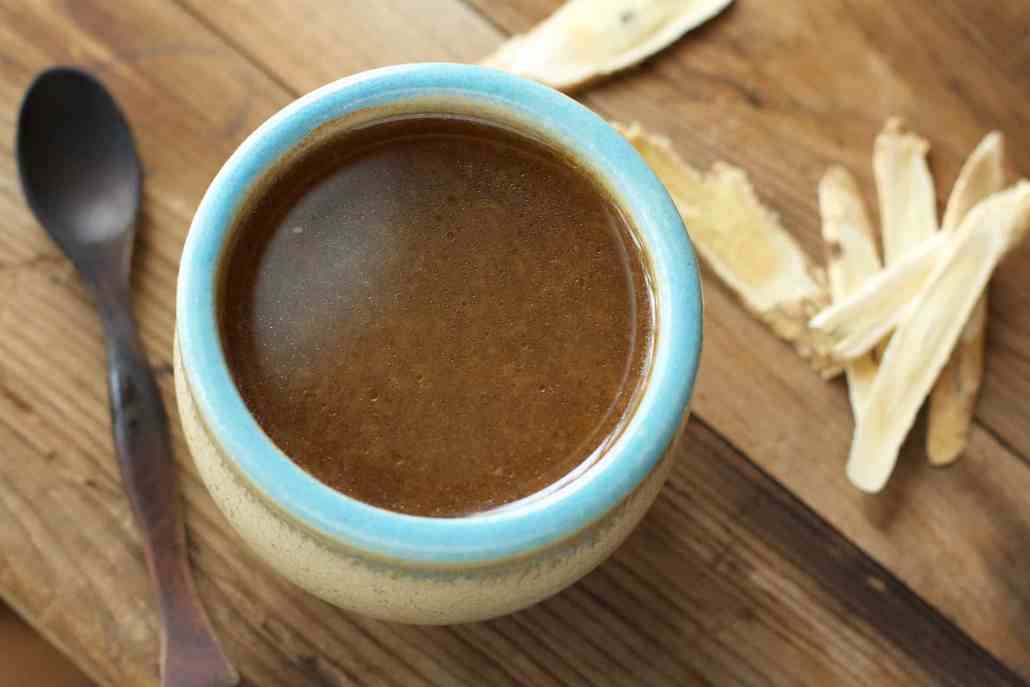
Fight Colds and Flu with This Astragalus Miso Soup
There are some nasty viruses going around and they are so severe they are making the headlines. Apparently, seasons when H3N2 is most prevalent tend to be the worst seasons for the flu. This is due to two factors. The first is that people born before 1968 seem to be especially susceptible to the disease and, secondly, because vaccines don’t work well against what some call a “tricky” virus.1
In addition to the flu virus there are two other respiratory viruses that are also making the rounds.
Before these viruses started making the headlines I knew we were in for an intense season because I got sick. Twice! Once right after the other. I could hardly believe it.
I was also scratching my head a bit: I was eating well, sleeping well, taking Vitamin D3… okay so I was a little stressed around that time as well, but I couldn’t point to a big reason for getting sick. And to be fair, we don’t always get to decide if we get a virus. Although we have some control over our immune system strength, sometimes viruses are incredibly virulent.
Then something occurred to me. I used to get sick every winter, multiple times. Then I started taking a lot of astragalus. This is an amazing herb for building the immune system. It increases immune system function in multiple ways and does so in a normalizing way. This means that people who are both immune deficient and immune excessive can often benefit from its gifts.
Although astragalus had been a wonderful herb for me in the past, I wasn’t currently taking it. I normally make pot after pot of chai spices with lots of astragalus and drink that throughout the winter. But I think I just got tired of that preparation. I was craving something else.
After trying a couple of different recipes, I’ve come up with my new favorite astragalus recipe: Astragalus and Miso Soup.
Before we get to the astragalus and miso soup recipe, here’s some more information about astragalus and miso.
Astragalus (Astragalus propinquus syn A. membranaceus)
Astragalus is a pea family plant that originally comes from China. Western herbalists have really fallen for this herb and it is commonly used in Western herbalism as well. There are thousands of different Astragalus genus plants in the world and most of them are toxic. Be sure to either buy, grow or harvest Astragalus propinquus.
Astragalus is an immunomodulating herb that is commonly used to normalize immune system function. I often think of it specifically for people who are regularly coming down with upper respiratory viruses. You can also simply use it to maintain wellness. From limited human clinical trials and from in vitro studies, we know that astragalus increases the white blood cell count, decreases viral replication, and stimulates the production of T killer cells.2 3 4 5
Traditionally astragalus is cooked into foods like soups or rice. It is commonly sold as long thinly sliced roots that can be easily removed from the dish before eating (it’s never edible as the root remains too fibrous). If you are using astragalus to maintain wellness then putting some roots in a soup or rice dish can be a good way to use it. If you are wanting to use astragalus to strengthen your immune system then you will most benefit from using it in higher dosages, daily, for a long period of time. In Chinese Medicine astragalus is used in very high dosages, sometimes up to 100 grams per day.
This astragalus and miso soup recipe uses 30 grams of astragalus root per serving. Here’s what that looks like in a bowl (I recommend getting a simple kitchen scale to weigh it out.)
For this recipe I recommend getting roots that are either cut up finely or the long thin roots. You could use the powder but it may make your beverage gritty as it is difficult to strain out.
Miso
Miso is a fermented bean sauce that comes to us from Japanese cuisine and culture. It is full of probiotics. It is often made with soybeans and grains but you can find both soy-free and gluten-free miso. Regularly consuming live fermented foods high in probiotics is a great way to support healthy gut flora. Our intestinal bacteria has been strongly linked to immune system health.
You can find miso pastes in the refrigerated section of your health food store or grocery store. If your local store doesn’t carry it, ask them to start! My favorite miso comes from South River Miso and you can order from them direct. I recommend the Dandelion Root Leek Miso.
To get the best results with miso, never cook it. Instead, remove the broth from heat, you can even let it cool a bit, then add the miso. The amount you add is up to you. I love the savory salty taste of miso and I often add large heaping tablespoons to my broths and soups.
Avoid miso that is sold as a powder and is not refrigerated as this does not have probiotics.
Astragalus Miso Soup Recipe
This is a super simple recipe to make, but one that is incredibly beneficial for immune system health. It’s also delicious and the perfect thing to curl up with in the winter. This can be drank as a morning beverage, or eaten as a simple soup before a meal. For best results, enjoy this astragalus and miso soup regularly. Any type of broth can be used for the base; you could even use water. This broth could be the start of a more complex soup. You could add sliced garlic, a sautéed onion, some strips of seaweed, fried tempeh and on and on.
What you’ll need…
- 2 cups broth (bone broth, meat broth, veggie broth)
- 30 grams astragalus
- Pinch of freshly ground black pepper
- 1-3 tablespoons miso
- Place the broth, astragalus, and black pepper into a medium sized sauce pan with a tight fitting lid.
- Bring to a simmer, cover, and continue to simmer on low for 30 minutes.
- Strain off the broth. You could use the astragalus again if desired, otherwise compost.
- Let the broth cool slightly, then add your desired amount of miso.
- Serve warm in a mug or as a simple soup.
Yield: This yields about 1 1/2 cups and is a single serving.
Now I’d love to hear from you.
Have you ever used astragalus?
What other ingredients might you add to this soup?
Let me know in the comments below.

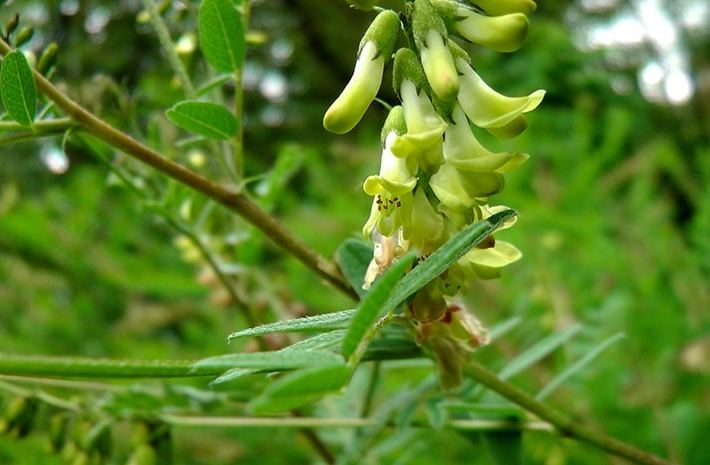
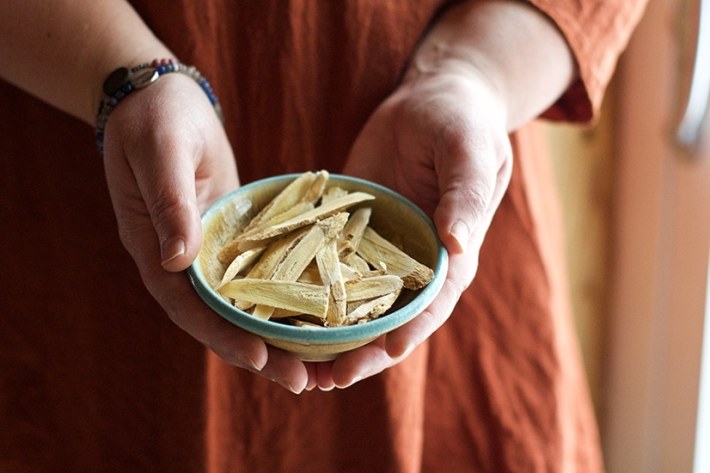
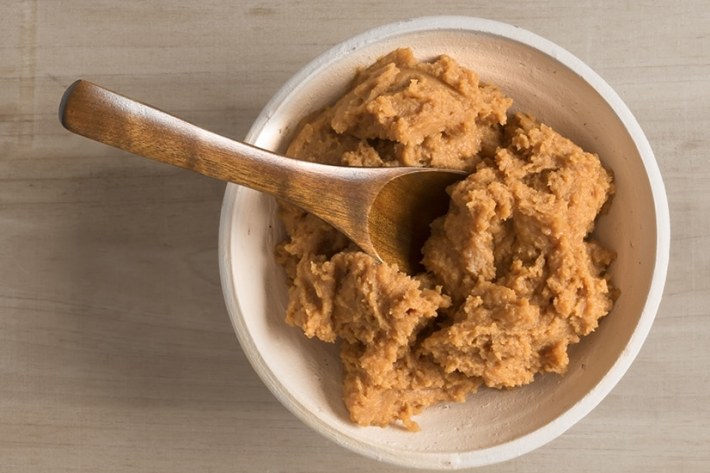
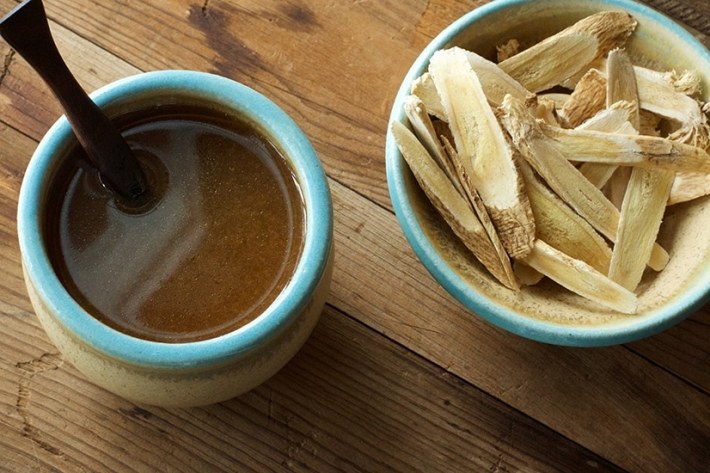
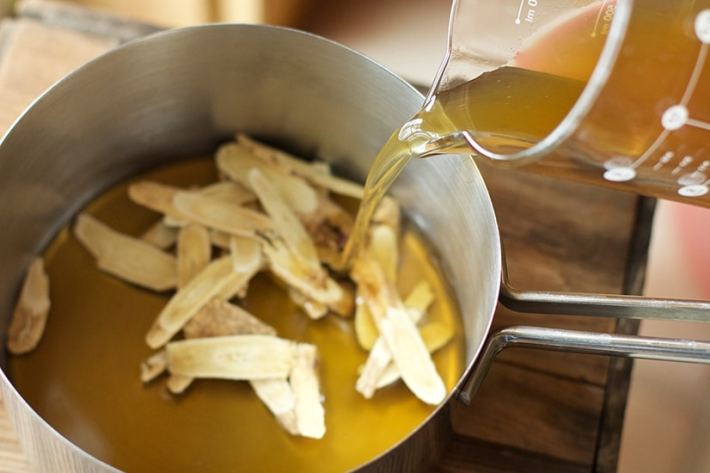


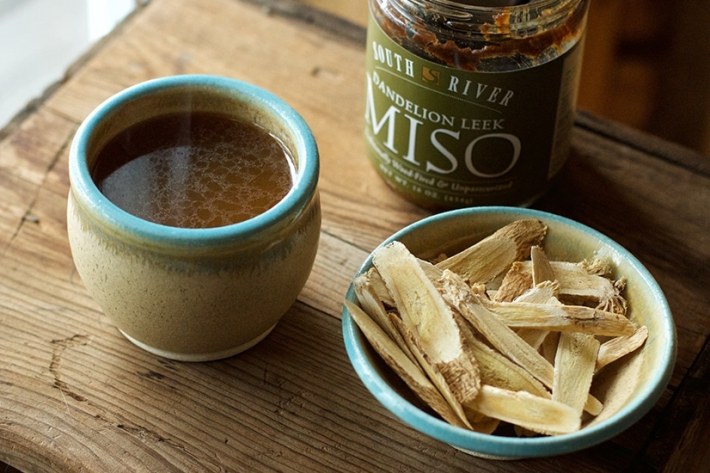
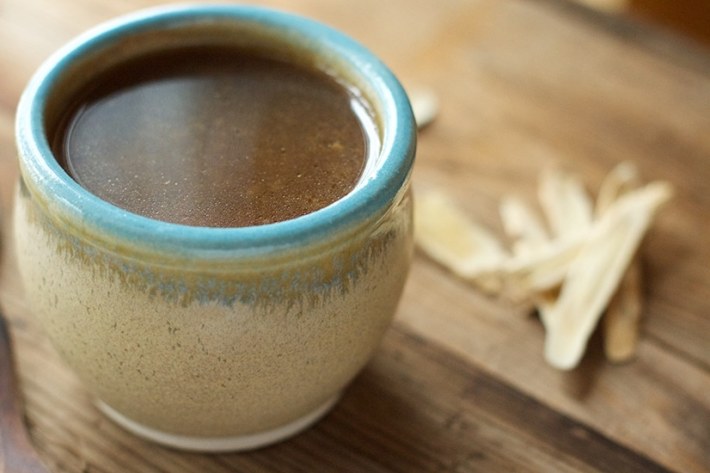








I bought Astragulus from the herbal company Learning Herbs recommends (Mountain Rose) and was disappointed to see that it comes from China. ( In fact, the dandelion root,reishi, and sage I bought from them also came from China. ) This disturbed me for a couple reasons: firstly, I prefer to buy local and most of these products are available from local herbalist. Secondly, I’ve heard that China is iffy as regards quality. Do you know if there is an outlet to find Astragulus more locally? This soup sounds great.
One of the reasons we love Mountain Rose Herbs so much is because they do extensive testing on all of the herbs they sell. So not only are all of the cultivated herbs they sell certified organic, they are also extensively tested to be certain they are free of harmful chemicals. Mountain Rose Herbs also has direct relationships with their farmers and they are helping farmers all over the world to be able to grow organic herbs. You can read more about those stories on their blog.
I don’t know of a farm in North America that sells astragalus – but there may be one. I have a listing of US and Canadian farmers on my site. You could check with them to see if you can find someone. https://www.herbalremediesadvice.org/Herb-Farms-Wildcrafters.html
Hello! Would you clarify whether or not we should use astragulus if we already have a cough, cold, or flu? I thought astragulus drives an illness deeper into the system. Thank you.
This is a bit of a controversy in the herbal world. While it is commonly repeated that astragalus shouldn’t be taken while sick, some herbalists say this is a misinterpretation of Chinese texts. I generally don’t recommend it for acute colds/flus. There are other herbalists who do recommend it.
I love your Astragalus Chai! That is the only other recipe I have made with astragalus.
Thank you for this. I have been a fan of South River Miso for a long time . Will definitely look into the astragalus addition.
I like adding ginger root, shitake mushrooms and some kale. Cooking some tonight! Yum Yum!!!
I’ve never thought of adding astragalus roots! Made it twice since your post! Thank you for all generous sharing of your knowledge!!
I’ve also been hesitant from ordering some of MRH products when sourced from China! Hearing of their extensive testing helps calm my fears…some!
On a side note I wondered your opinion on soybeans being the base of most miso products? For the last year or so I’ve been using the chickpea version. The soy ‘controversy’ is never too far from my mind! I guess my question is the fact that since the end product of miso is a fermented product, in my wee mind that makes eating this form of soybeans, ‘okay’!?! This time of year especially, miso soup can be a daily happening! Total long ramble but after looking at South River Miso offerings, I’m ready to branch out!!
Thank you for your time!!~Dona
In my early 20’s I went bonkers for soy and definitely ate too much of it! Now I am very wary of my soy intake. However, from what I understand, small amounts of fermented soy are just fine. South River does have some great blends – including chickpea versions.
I agree! I think fermenting changes the game! I’m reminded of an article I read awhile ago that set my mind more at ease! http://catchinghealth.bangordailynews.com/2016/04/07/blog/soy-and-breast-cancer/
We have a local co-op that serves the best marinated tofu that for years I ate like cotton candy! I’ve since kept the word moderation in the forefront when eyeing my choices in the deli case👍🏻
Being observant is not where I shine!! Just noticed that this site is Seattle’ish’ based!! I’m north of there by a bit and wondered if you had a practice/consult of sorts?
I appreciate your response and again the great resource you and learning herbs are to me!!!
Thanks for your interest Dona. I live in North Central WA. I am not currently taking new clients. There are many fabulous herbalists out there. HerbRally.com and the American Herbalist Guild both have listings.
You suggested only buying astragalus propinquus, however, most places, including Mountain Rose Herbs, are only selling astragalus membranaceous. Is this a suitable substitute?
I would lole clarification on this as well when you get a moment
Great question! Those are the same plant. It used to be named Astragalus membranaceus but that botanical name has changed to Astragalus propinquus, but it always takes awhile for names to shift.
I would consider adding the 14 Mushroom Blend powder too for added benefit!
You mentioned you can save the astragalus & reuse it. How long/how many times is it still good?
Ps – super yummy & nourishing. Thank you!
How much is 30 grams?
My new go-to breakfast! Everyone is getting sick around me, and with the dropping temperatures (snow in the valley!), this is the perfect, delicious start to my day! Thank you :)
Beware! Don’t believe this. This should be removed!